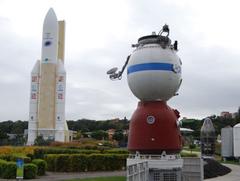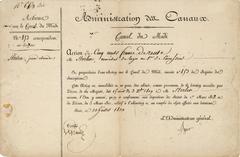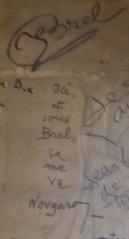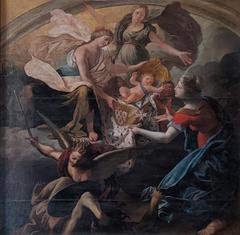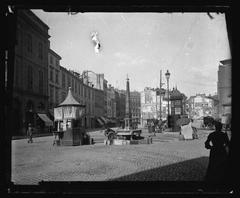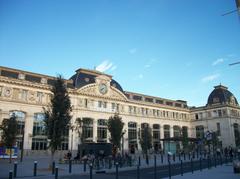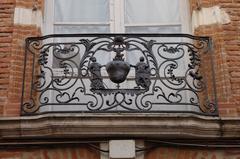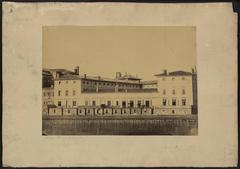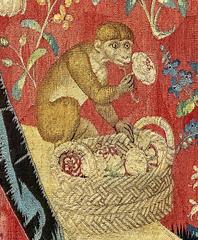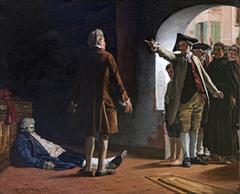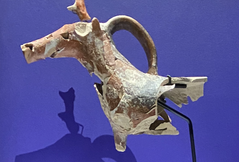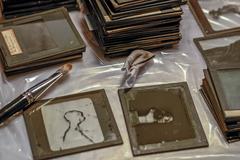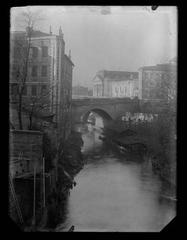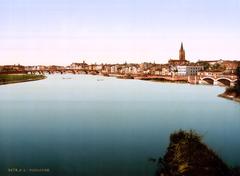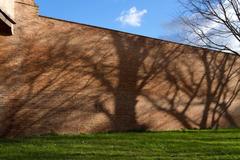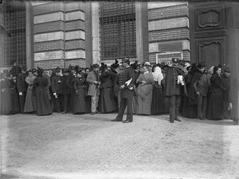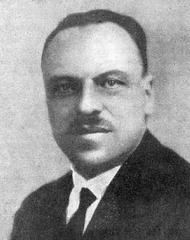Esquirol Toulouse Visiting Hours, Tickets, and Historical Sites Guide
Date: 04/07/2025
Introduction to Esquirol Toulouse and Its Significance
Esquirol, located in the bustling heart of Toulouse, France, is a district where history, culture, and modern urban life converge. Centered around Place Étienne-Esquirol, the area is steeped in a rich past, tracing its roots from Roman times through the medieval and Renaissance periods to the lively present day. Named after the pioneering psychiatrist Jean-Étienne Dominique Esquirol, the district not only celebrates its intellectual heritage but also serves as a vibrant center for social, commercial, and cultural activities.
With excellent public transport links, including the Esquirol metro station and numerous bus routes, Esquirol is easily accessible for all visitors. Its blend of historical landmarks, such as Notre-Dame de la Dalbade and Hôtel d’Assézat, bustling cafés, and shopping streets makes it an essential stop for anyone seeking an authentic Toulouse experience. This detailed guide provides practical visitor information, ticketing, accessibility tips, and highlights the top historical sites in Esquirol, Toulouse.
For the latest updates and more in-depth insights, visit the Toulouse tourism website.
Table of Contents
- Introduction
- Historical Overview: Origins and Early Development
- The Legacy of Jean-Étienne Dominique Esquirol
- Urban Evolution: From Ancient Forum to Modern Hub
- Social and Commercial Importance
- Architectural and Urban Features
- Civic and Cultural Life
- Integration with Toulouse’s Heritage and Attractions
- Visitor Information: Hours, Accessibility & Transport
- Tips for Visitors
- Frequently Asked Questions (FAQ)
- Key Attractions: Visiting Hours & Tickets
- Notre-Dame de la Dalbade: A Highlight of Esquirol
- Summary and Final Tips
- References & Official Sources
Historical Overview: Origins and Early Development
The Esquirol district stands at a crossroads that has been central to Toulouse’s development since Roman times. Situated at the intersection of major thoroughfares and near the Garonne River, this area initially formed part of Tolosa’s ancient forum—serving as a bustling marketplace and gathering spot. Over the centuries, Esquirol has mirrored Toulouse’s growth, evolving in urban planning, commerce, and civic life (Wikipedia).
The Legacy of Jean-Étienne Dominique Esquirol
Place Étienne-Esquirol is named for Jean-Étienne Dominique Esquirol (1772–1840), a renowned psychiatrist born in Toulouse. Esquirol advanced the humane treatment of mental illness and laid the foundations for modern psychiatry (Nairaquest). The square was officially dedicated to him in 1867, cementing his legacy within the city’s landscape.
Urban Evolution: From Ancient Forum to Modern Hub
Throughout history, the area now known as Place Étienne-Esquirol has functioned as a vital crossroads, linking the commercial heart of Toulouse with surrounding districts and the Garonne. Its unique elongated form—167 meters long and up to 47 meters wide—reflects its historical role as a thoroughfare rather than a traditional plaza. The construction of the Pont Neuf in the 17th century directly connected Esquirol to southern neighborhoods, boosting its importance as a transit and commerce hub. Today, the square is a pivotal node in Toulouse’s public transport network, served by the Esquirol metro station (Line A), various bus lines, and bike-sharing services (Barnes Toulouse).
Social and Commercial Importance
Esquirol has long been a prominent meeting point for Toulouse’s residents. In the early 20th century, it blossomed as a social center, with notable cafés and brasseries such as Aux caves du Père Léon (est. 1905) and historic bars like Unic-Bar and Paddy. The area’s commercial vibrancy continues today, with proximity to shopping destinations along Rue de Metz, Rue Saint-Rome, and a variety of boutiques and restaurants (Barnes Toulouse).
Architectural and Urban Features
Esquirol’s streetscape is a tapestry of medieval alleys and 19th-century Haussmannian architecture, interwoven with Toulouse’s signature pink brick buildings. Place Étienne-Esquirol, though called a “square,” is more boulevard-like, lined with historic facades and contemporary amenities. The area features dedicated lanes for vehicles, pedestrians, cyclists, and public transport, as well as a central fountain and bike-sharing stations, ensuring accessibility and convenience for all (Barnes Toulouse).
Civic and Cultural Life
Due to its central location, Esquirol regularly hosts public gatherings, demonstrations (notably May 1st International Workers’ Day), festivals, and cultural events. Its open layout and accessibility make it a favored spot for both spontaneous and organized activities, reinforcing its role as a stage for Toulouse’s civic engagement (Solidaires Finances Publiques).
Integration with Toulouse’s Heritage and Attractions
Esquirol is a short walk from many of Toulouse’s must-see sites:
- Place du Capitole: The city’s symbolic main square, featuring the Capitole building (city hall and opera house).
- Musée des Augustins: Premier art museum housed in a former monastery.
- Pont Neuf: The oldest bridge in Toulouse, offering stunning Garonne River views.
- Carmes District: Known for its food markets and vibrant nightlife.
This centrality makes Esquirol an excellent base for exploring Toulouse’s historic and cultural riches.
Visitor Information: Hours, Accessibility & Transport
- Visiting Hours: Public spaces like Place Étienne-Esquirol and Pont Neuf are open 24/7.
- Entry Fees: Squares and most outdoor attractions are free to access.
- Accessibility: Smooth pavements and curb cuts provide wheelchair access; many cafés and shops are accessible.
- Transport:
- Metro: Esquirol station (Line A).
- Bus: Lines 12, 31, 38, and others.
- Parking: Underground garages at Place du Capitole and along Rue d’Alsace-Lorraine.
- Bicycles: VélôToulouse bike-sharing station no. 10 is located on-site.
Tips for Visitors
- Visit early morning or late afternoon for a quieter experience.
- Join a guided walking tour for deeper insights into Esquirol’s history and culture.
- Best photo spots include the Pont Neuf entrance, Place Esquirol’s fountain, and Notre-Dame de la Dalbade.
- Monitor the Toulouse city website for event updates.
Frequently Asked Questions (FAQ)
Q: What are the visiting hours for Place Étienne-Esquirol?
A: The square is open to the public 24 hours a day.
Q: Is there an entry fee to visit Esquirol?
A: No, public spaces such as Place Esquirol and Pont Neuf are free.
Q: Are guided tours available?
A: Yes, multiple providers offer themed walking tours; check with local operators or the tourism office.
Q: Is Esquirol accessible for visitors with reduced mobility?
A: Yes, most public spaces and many shops and cafés are wheelchair accessible.
Q: Where can I find parking?
A: Underground parking is available at Place du Capitole and nearby streets.
Key Attractions: Visiting Hours & Tickets
Below is a summary of major attractions in Esquirol and nearby, including practical information:
| Attraction | Opening Hours | Tickets | Accessibility |
|---|---|---|---|
| Place Étienne-Esquirol | 24/7 | Free | Wheelchair accessible |
| Hôtel d’Assézat (Bemberg) | Tue–Sun, 10:00–18:00 | €8 (discounts available) | Wheelchair accessible |
| Place du Capitole | Daily | Free; tours ~€5 | Wheelchair accessible |
| Musée des Augustins | Tue–Sun, 10:00–18:00 | €7 | Wheelchair accessible |
| Musée du Vieux Toulouse | Tue–Sun, 10:00–18:00 | €5 | Limited accessibility |
| Notre-Dame de la Dalbade | Mon–Sat, 9:00–18:00 | Free | Step-free access |
| Saint-Étienne Cathedral | Daily, 9:00–18:00 | Free | Limited accessibility |
Notre-Dame de la Dalbade: A Highlight of Esquirol
History and Architectural Highlights
Notre-Dame de la Dalbade is a 15th-century church exemplifying Toulouse’s unique mix of Gothic and Renaissance architecture. It is renowned for its brick and stone façade, intricate stained glass, and historical significance within the Esquirol district (Barnes Toulouse).
Visiting Information
- Opening Hours: Monday to Saturday, 9:00 AM – 6:00 PM; closed Sundays and public holidays.
- Admission: Free.
- Guided Tours: Available by request—book in advance through the tourism office.
How to Get There
- Metro: Esquirol station (Line A), a short walk away.
- Bus: Multiple lines serve the area; pedestrian-friendly streets encourage walking.
Nearby Attractions
- Musée des Augustins: Gothic and Renaissance art.
- Place Esquirol: Street performances and festivals.
- Local Cafés and Bistros: Enjoy classic Toulousain cuisine.
Accessibility
Step-free main entrance; assistance available on request.
Visitor Tips
- Greet staff with a polite “bonjour.”
- Photography without flash is allowed.
- Early morning or late afternoon visits are less crowded.
- Combine your visit with a stroll through Esquirol for a full neighborhood experience.
Frequently Asked Questions (FAQ)
- Is there an entrance fee?
No, entry is free. - Are guided tours available?
Yes, book through the tourism office. - Is the church wheelchair accessible?
Yes, via the main entrance.
Summary and Final Tips for Visiting Esquirol, Toulouse
Esquirol is a vibrant crossroads where history, culture, and modern city life come together. Its Roman roots, dynamic commercial scene, and architectural gems like Place Étienne-Esquirol and Notre-Dame de la Dalbade make it a must-visit district. With excellent transport links, accessible amenities, and a welcoming atmosphere, Esquirol offers something for every traveler. For the most up-to-date information on visiting hours, tickets, events, and guided tours, consult the Toulouse Tourist Office and enhance your experience with the Audiala app.
References & Official Sources
- This guide incorporates information from the Toulouse Tourism official site.
- Additional details from Barnes Toulouse.
- Site history and heritage: Wikipedia.
- Biography of Jean-Étienne Dominique Esquirol: Nairaquest.
- Civic events and demonstrations: Solidaires Finances Publiques.
- Information on local education: L’Étudiant.
- Notre-Dame de la Dalbade: Toulouse Tourism.
For a seamless and enriching visit to Esquirol, download the Audiala app for guided audio tours, insider tips, and real-time updates. Follow us on social media for inspiration and the latest events in Toulouse.
